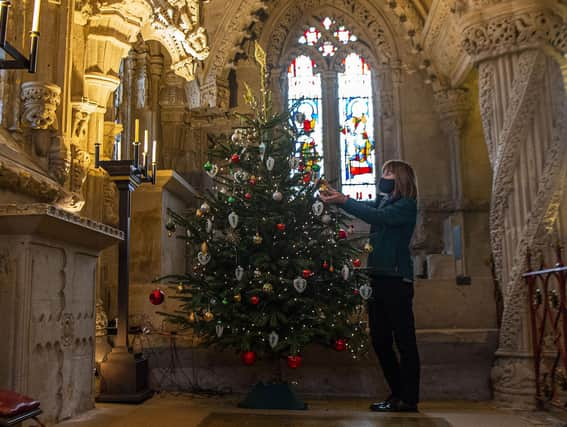Christmas message gives hope in dark times - Murdo Fraser


Like so many other families across Scotland, my own suffered loss this year. There will be faces absent at tables over the festive season which we will not see again in this world. It is particularly poignant at a season which is so much about family, when those who were present last Christmas are, for the first time, missing. There are no cards or presents to be exchanged with them this time; now they are simply a memory.
We have lived through the last 12 months with the spectre of Covid claiming the lives, mostly, of the elderly and vulnerable. As I write this, it looks like the Omicron variant will lead to a new wave of infections, hospitalisations, and deaths. It is a sobering point to reflect on as we reach another year’s end. 21 months on from Covid first coming to our shores, there is little sign that its impact is abating, with all the dreadful consequences that it brings.
Advertisement
Hide AdAdvertisement
Hide AdIn our society, we do not much like to reflect on death and what it means. For most of us, it is something that happens to only the very old and the very sick; to be pushed to the back our minds, and certainly not to be discussed openly. In the recent past it has been only when the young die, from accident or disease, that we have been awakened to the fragility of life, but the emergence of Covid has, perhaps, brought the reality of death closer to home than many of us would like.
It has not always been like this. In previous generations, and in particular prior to the advent of modern medicine, death was ever-present, and accepted as just a part of life. As recently as the early 20th century, people had large families in the expectation that many young children would not reach adulthood. Young people grew up with the reality that brothers and sisters had barely an equal chance of making it into their teens. Diseases, infections, and limb fractures, which today our NHS treats quickly and easily, would too often prove fatal, particularly amongst the very young.
When researching the history of 17th century Scotland some years ago for my book on the rivalry between the 1st Marquis of Montrose and the Marquis of Argyll – the two great combatants of the Covenanting Wars - I was struck by the extent to which the characters of the time reflected on the nature of their own deaths. We should not be surprised at this: death was all around them. Added to the risks of disease, illness and injury, those who were soldiers came face to face with it on the battlefield, while statesmen in these troubled times risked the real threat of execution if they ended up on the losing side.
Like many of their contemporaries, both Montrose and Argyll would die on the scaffold at the Mercat Cross in Edinburgh; Montrose, having been stripped of his titles, being hanged as a commoner, whilst Argyll suffered the nobleman’s death by the Maiden. Each died proclaiming their Christian faith, and in the confidence, as Montrose wrote in a famous poem penned on the eve of his execution, that his Lord would “raise me with the just”.
For those of that generation in Scotland’s story, death was simply part of life, and the manner of one’s dying – in the words of Argyll, spoken to his advocate George MacKenzie, not as a Roman braving death, but as Christian without being affrighted – was as important as one’s conduct whilst alive. A person would be judged by history, as much as by God, according to how they left this life.
It is this sense that death is not an end, but simply a transition from one life to the next, once so prevalent in our society and still mainstream amongst many peoples throughout the world, that we seem largely to have lost. As religion has occupied a lesser place in the hearts of many people, we prefer simply not to dwell on death; instead we shut it out as we would close the door on a dark winter night. The comfort that previous generations had from their faith is no longer with us.
We should take cheer from the words of Wesley’s carol:
“Born to raise the sons of earth
Born to give them second birth”.
For in a few words this is the message of the Christmas period. It is about a small child, born to conquer death, to remove its fear, and to give us hope.
Family gatherings, the exchanges of presents and overconsumption of food and drink, may well be for us pleasurable parts of the Christmas season, but they are not in essence what this most Christian of festivals is about. It is about remembering the Christ child who came to earth to bring us light, life and healing.
Advertisement
Hide AdAdvertisement
Hide AdFor all human beings, death is a reality that we cannot avoid. What we can do is have faith that it is not an end, but simply the beginning of something that is better. That is the hope that Christmas brings us, and the promise of new life is there to all those who believe.
Comments
Want to join the conversation? Please or to comment on this article.